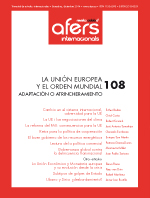La UE ante la reforma del FMI: préstamos como medida de atrincheramiento
Palabras clave:
Unión Europea, FMI, crisis, estructura hegemónicaResumen
Revista CIDOB d’Afers Internacionals, nº 108
Cuatrimestral (septiembre-diciembre 2014)
ISSN:1133-6595 | E-ISSN:2013-035X
En 2010, la Junta de Gobernadores del FMI aprobó la Decimocuarta Revisión General de Cuotas, que propone una redistribución importante del poder de voto, el cual se desplazaría de los estados europeos «sobrerrepresentados» a los infrarrepresentados» países de mercados emergentes. Los resultados, cuando esto se implemente, situarán a los cuatro países BRIC (Brasil, Rusia, India y China) entre los diez principales donantes al FMI. Utilizando el marco analítico que proponen Barbé et al. (2014), este artículo considera los recientes cambios a la luz del fracaso del sistema de Bretton Woods en 1971, la transición al préstamo en condiciones favorables y la reestructuración de la deuda soberana. Dado que los enormes préstamos para rescatar a Grecia, Irlanda y Portugal aconsejan continuar usando el FMI para promover los intereses de la UE, se argumenta que es demasiado pronto para hablar de decadencia europea en el seno del Fondo.
Citas
Barbé, Esther; Costa, Oriol; Herranz-Surrallés, Anna y Kienzle, Ben. «The EU in an unsettled international system: Coping with the power shift in global governance». Paper presentado en la Conferencia de la International Studies Association (ISA), Toronto (Canadá), 26-29 de marzo de 2014 (en línea) http://www.eu-ianus.eu
Bini Smaghi, Lorenzo. «A single EU seat in the International Monetary Fund?», en: Jørgensen, Knud Erik (ed.). The European Union and International Organizations. Londres: Routledge, 2009, p. 61-79.
Bini Smaghi, Lorenzo. «A Single Seat in the IMF». Journal of Common Market Studies, vol. 42, n.º 2 (2004), p. 229-248.
Breen, Michael. The Politics of IMF Lending. Basingstoke: Palgrave, 2013.
Clegg, Liam. Controlling the World Bank and IMF: Shareholders, Stakeholders, and the Politics of Concessional Lending. Basingstoke: Palgrave, 2013.
Cox, Robert W. «Social Forces, States and World Orders: Beyond International Relations Theory». Millennium: Journal of International Studies, vol. 10, n.º 2 (1981), p. 126 155.
Dreher, Axel; Sturm, Jan-Egbert y Vreeland, James R. «Global horse trading: IMF loans for votes in the United Nations Security Council». European Economics Review, n.º 53 (2009), p. 742-57.
Eichengreen, Barry. Globalizing Capital: A History of the International Monetary System. Princeton: Princeton University Press, 2008.
Frieden, Jefrey A. Global Capitalism: Its Fall and Rise in the Twentieth Century. Nueva York: W.W. Norton, 2007.
Garnier, Carole; Daco, Daniel y Di Mauro, Francesca. «UN-EU cooperation on financial issues: The role of the European Union at the International Monetary Fund and the World Bank», en: Wouters, Jan; Hoffmeister, Frank y Ruys, Tom (eds.). The United Nations and the European Union. An Ever Closer Partnership. La Haya: T.M.C. Asser Press, 2006, p. 115-134.
Gowan, Richard. «The Obama Administration & multilateralism: Europe Relegated». FRIDE Policy Brief, n.º 39 (2010) (en línea) [Fecha de consulta 09.06.2014] http://fride.org/download/pb39_multilateralism_eng_feb10.pdf
Helleiner, Eric. «Political determinants of international currencies: what future for the dollar?». Review of International Political Economy, vol. 15, n.º 3 (2008), p. 354-378.
Ikenberry, G. John. Liberal Leviathan: The Origins, Crisis, and Transformation of the American World Order. Princeton: Princeton University Press, 2011.
IMF. «IMF Executive Directors and Voting Power, and IMF Board of Governors». Washington: IMF, 2014 (en línea) [Fecha de consulta 10.06.2014] http://www.imf.org/external/np/sec/memdir/members.aspx#U
IMF. «IMF Executive Board Approves Major Overhaul of Quotas and Governance». Comunicado de prensa, n.º 10/418 (2010a). Washington: IMF (en línea) [Fecha de consulta 10.06.2014] http://www.imf.org/external/np/sec/pr/2010/pr10418.htm
IMF. «IMF Executive Board Approves €22.5 Billion Extended Arrangement for Ireland». Comunicado de prensa, n.º 10/496 (2010b). Washington: IMF (en línea) [Fecha de consulta 10.06.2014] https://www.imf.org/external/np/sec/pr/2010/pr10496.htm
IMF. «IMF Quota and Governance Reform – Elements of an Agreement». Washington: IMF, 31 de octubre de 2010c (en línea) [Fecha de consulta 10.06.2014] http://www.imf.org/external/np/pp/eng/2010/103110.pdf
Kennedy, Paul. The Parliament of Man, Londres: Penguin, 2006.
Kissack, Robert. Pursuing Effective Multilateralism: The European Union, International Organisations, and the Politics of Decision Making. Basingstoke: Palgrave, 2010.
Laatikainen, KatieV. y Smith, Karen E. (eds.). The European Union at the United Nations: Intersecting Multilateralisms. Londres: Palgrave, 2006.
Leech, Dennis y Leech, Robert. Voting power implications of a unified European representation at the IMF. Londres: LSE Research Online, 2005 (en línea) http://eprints.lse.ac.uk/565/
McNamara, Kathleen y Meunier, Sophie. «Between national sovereignty and International power: What external voice for the euro?». International Affairs, vol. 78, n.º 4 (2002), p. 849-868.
Pisani-Ferry, Jean. «The Accidental Player: The European Union and the global economy», en: Jørgensen, Knud Erik (ed.). The European Union and International Organizations, Londres: Routledge, 2009, p. 21-36.Polanyi, Karl. The Great Transformation: The Political and Economic Origins of Our Time. Boston: Beacon Press, 2001[1957].
Ruggie, John G. «Multilateralism: The Anatomy of an Institution». International Organization, vol. 46, n.º 3 (1992), p. 561-598.
Ruggie, John G. «International Regimes, Transactions, and Change: Embedded Liberalism in the Postwar Economic Order». International Organization, vol. 36, n.º 2 (1982), p. 379-415.
Stiglitz, Joseph. «Is there a post Washington Consensus», en: Stiglitz, Joseph y Serra, Narcís (eds.). The Washington Consensus Reconsidered. Nueva York: Oxford University Press, 2008, p. 41-56.
Stone, Randall W. «Political Economy of IMF Lending in Africa». American Political Science Review, vol. 98, n.º 4 (2004), p. 577-591.
Vreeland, James R. The International Monetary Fund: Politics of Conditional Lending. Londres: Routledge, 2007.
Wade, Robert y Venereso, Frank. «The Asian Crisis: The High Debt Model vs. the Wall Street-IMF-Treasury Complex». New Left Review, n.º 228 (1998), p. 3-23.
Waltz, Kenneth. Theory of International Politics. Reading, MA: Addison-Wesley, 1979.
Woods, Ngaire. «The United States and the International Financial Institutions: Power and Influence Within the World Bank and the IMF», en: Foot, Rosemary; MacFarlene, S. Neal y Mastanduno, Michael (eds.). US Hegemony and International Organizations. Oxford: Oxford University Press, 2003, p. 92-114.
Wouters, Jan y Van Kerckhoven, Sven. «The International Monetary Fund», en: Jørgensen, Knud Erik y Laatikainen, Katie V. (eds.). Routledge Handbook on the European Union and International Institutions. Londres: Routledge, 2013, p. 221-233.
Zakaria, Fareed. «The Future of American Power». Foreign Affairs, vol. 87, n.º 3 (2008), p. 18-43.













